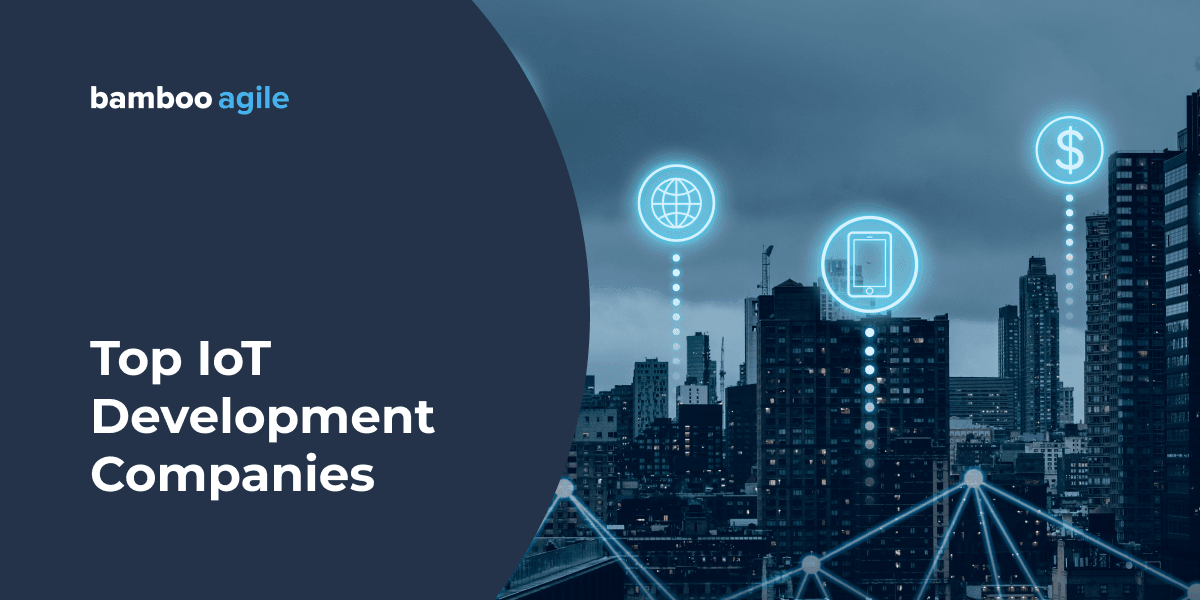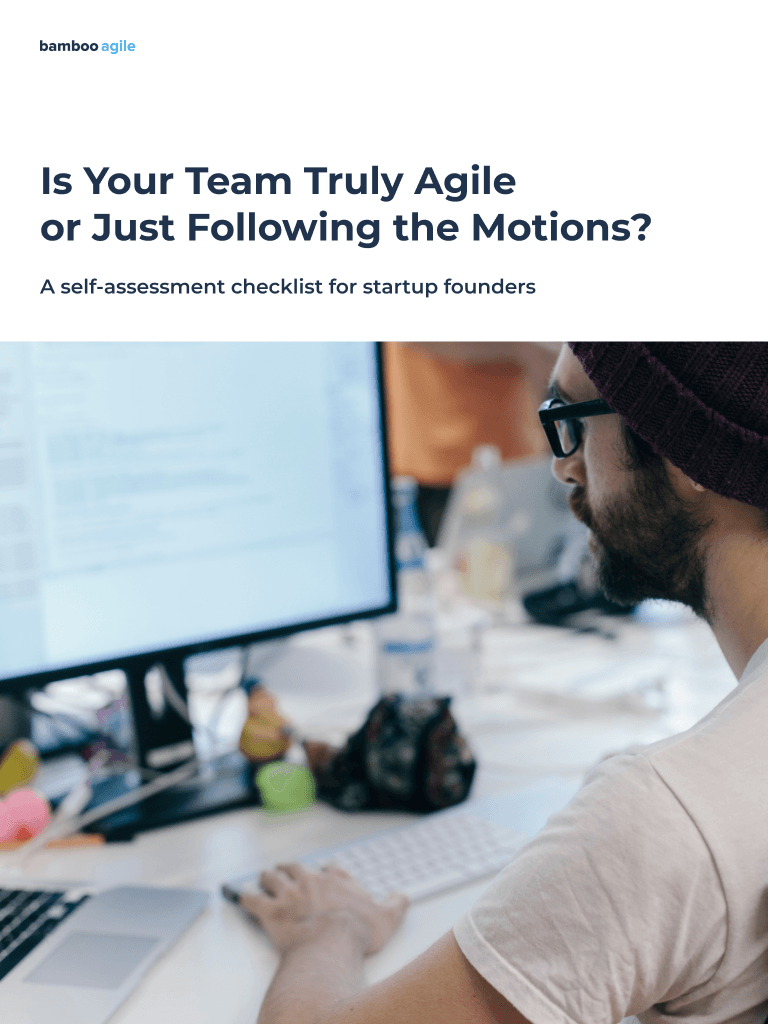The Internet of Things has moved far beyond consumer gadgets. Today, enterprises in manufacturing, logistics, healthcare, energy, and transportation rely on IoT systems to improve safety, cut costs, and unlock new revenue streams.
But while the opportunities are vast, developing enterprise-ready IoT solutions is complex. It requires expertise in hardware, embedded engineering, cloud computing, and industry-specific compliance. That’s why many enterprises turn to specialized IoT development companies with proven track records.
Below, we highlight 10 IoT partners that enterprises trust in 2025. Each has its own strengths, ranging from device connectivity to large-scale cloud ecosystems.
Bamboo Agile

Headquartered in Tallinn, Estonia, Bamboo Agile has more than 20 years of experience in software engineering and a strong reputation in IoT development. They are able to deliver end-to-end ecosystems: firmware, connectivity, data management, cloud infrastructure, and end-user apps.
Their expertise spans critical industries such as healthcare, telecommunications, automotive, logistics, energy, and public safety. Its ability to handle the full lifecycle from firmware to analytics dashboards makes Bamboo Agile’s IoT development services so valuable.
Cogniteq

Founded in 2005, Cogniteq has offices in Poland, Lithuania, and the U.S. The company focuses on tailored IoT systems that serve highly specific use cases. Their portfolio covers embedded solutions, wearables, and connected mobile applications.
Healthcare and industrial organizations often choose Cogniteq because of its track record in safety-critical and specialized solutions. The company also explores unique domains such as pet tech and supply chain IoT.
HQSoftware

Operating since 2001, HQSoftware has built a reputation as a full-cycle IoT partner with a focus on intelligent, secure, and scalable architectures. With headquarters in Estonia and offices in the U.S. and Poland, they serve agriculture, automotive, and healthcare enterprises worldwide.
HQSoftware delivers IoT systems that combine strong backend architecture with cutting-edge computing and AI. Their team supports clients from pilot projects and proofs of concept all the way to full-scale deployment. For enterprises that need both security and scalability, HQSoftware is a strong candidate.
Binariks

Binariks, headquartered in the U.S. with development centers across Eastern Europe, is known for cloud-driven IoT solutions. Their services cover the development of cloud-based IoT platforms, embedded software engineering, system integration, and mobile connectivity.
The company works with industries as varied as real estate, finance, and logistics, helping enterprises upgrade both new and legacy infrastructure with IoT-enabled intelligence.
Itransition

With over two decades of global experience, Itransition has become a trusted partner for enterprises looking to integrate IoT into their digital ecosystems. They operate in more than 10 countries and serve clients ranging from startups to Fortune 500 companies.
What makes Itransition stand out is their ability to integrate IoT with enterprise software such as ERP, MES, SCADA, CMMS, PLM, and BI systems.
They’ve delivered solutions in smart cities, industrial IoT, healthcare, and retail, supporting enterprises that require both customization and large-scale integration.
Matellio

Headquartered in Denver, Matellio serves industries like automotive, logistics, and smart home automation.
The company provides IoT integration and product engineering services, firmware and device connectivity, automated testing and QA, continuous monitoring, and analytics.
Matellio stands out for helping enterprises evolve prototypes into market-ready products that remain secure and optimized long after launch.
Mobcoder

Mobcoder focuses on embedded development and firmware engineering. With offices in the U.S., India, and UAE, they deliver IoT systems with strong device-level optimization, covering areas like RTOS, LTE, sensors, and camera modules.
They also provide advisory services, system implementation, and long-term maintenance, which makes them a versatile IoT development partner.
iits-consulting GmbH

Germany-based iits-consulting GmbH specializes in real-time IoT systems that use cloud, predictive analytics, and remote monitoring. Their solutions often leverage edge computing and digital simulations for safer, faster deployment.
For enterprises that need low-latency decision-making and risk-free testing, iits-consulting provides strong technical capabilities.
Grey Rook GmbH

Another German firm, Grey Rook GmbH supports enterprises in defining IoT strategies and building secure architectures. Their services range from feasibility workshops to full-scale IoT platform development.
Their technical edge lies in microcontroller development, embedded Linux, and communication protocols such as Zigbee, LoRaWAN, and Bluetooth.
Ibiot

ibiot may be smaller than some of the other companies on this list, but it has carved out a niche by offering flexible, innovative IoT solutions. Their strength lies in hardware-software integration and the ability to adapt quickly to evolving client needs.
Enterprises looking for experimentation and rapid iteration often turn to ibiot for pilot projects and forward-looking initiatives.
How to evaluate Internet of Things development companies
Choosing among different IoT development companies isn’t just about who has the best pitch. Enterprises need to carefully evaluate vendors to ensure they can deliver on both the technical and business sides of IoT. Below are key factors to consider when assessing potential partners.
Industry experience and domain knowledge
IoT looks very different in healthcare, manufacturing, and smart cities. A vendor with relevant industry experience will understand compliance rules (HIPAA, GDPR, ISO standards, etc.), operational challenges, and integration requirements.
Scalability of solutions
It’s one thing to connect a few hundred devices for a pilot project, and another to manage millions of endpoints across multiple geographies. Scalability should be built into the architecture from day one.
Technology stack and capabilities
Truly reliable Internet of Things development companies need a broad technical skill set, mainly related to:
- Embedded engineering for devices and sensors
- Edge computing for real-time processing
- Cloud platforms (AWS IoT, Azure IoT Hub, Google Cloud IoT)
- Data analytics and AI for insights
- Mobile/web applications for end-user access
Integration with legacy systems
Most enterprises already run ERP, MES, or CRM systems. An IoT deployment that doesn’t integrate with existing IT becomes a silo. Vendors should have strong experience in system integration and interoperability standards like OPC UA, MQTT, and REST APIs.
Security and compliance
Security is one of the biggest concerns in IoT. Vendors should demonstrate experience in encryption, identity management, secure firmware updates, and compliance with local and international regulations.
Long-term support and maintenance
IoT projects don’t end at launch. Devices need firmware updates, cloud infrastructure requires optimization, and analytics systems need continuous refinement. Enterprises should look for vendors who provide post-deployment monitoring, updates, and support.
Cultural fit and communication
Even technically strong vendors can fail if collaboration breaks down. Clear communication, responsiveness, and cultural alignment are critical for long-term success.
You can ask how the vendor manages communication across distributed teams. If they also offer dedicated account managers or project leads.
Conclusion
IoT development companies on this list represent some of the most capable players in 2025 – each with proven expertise in hardware, connectivity, cloud, and data-driven intelligence.
If your enterprise is exploring IoT or looking to scale existing initiatives, partnering with a trusted end-to-end provider is crucial. Book a consultation with Bamboo Agile today and take the first step toward building your IoT solution.




